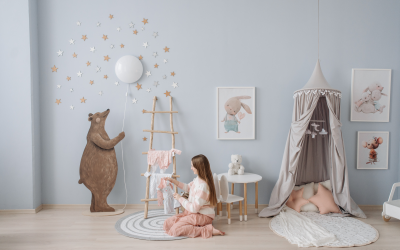Newborns have no set pattern when it comes to sleep. New parents struggle with creating a sleep routine for their little ones, especially in the first few months. They often ask, “how long should a newborn sleep.”? The National Sleep Foundation suggests newborns receive 14-17 hours of sleep a day, but this sleep doesn’t happen in one go. Instead, infants snooze in shorter blocks during both the day and night.
A newborn baby can’t differentiate between day and night. It takes an average of at least six months for a baby to get accustomed to regular sleep rhythms.
Newborn Sleep Requirements
A newborn baby would snug in a total of 7-8 hours during the day and around 9 hours during the night. As babies have small stomachs, they would wake up several times during the night to eat. If your newborn sleeps for longer stretches, wake him up every 3-4 hours to feed.
Once your little one starts to show signs of good weight gain, you can let her sleep for longer durations at night. How much time your baby sleeps depends on her age and what she is being fed. Bottle-fed babies usually remain satisfied for 3-4 hours, while breast-fed babies need to be fed every 2-3 hours.
In the first couple of months, a newborn would sleep for one to three hours at a time during the night. Gradually, these chunks may become 4 to 5 hours long. At the age of 6 months, your baby’s sleep schedule would become more predictable, and she would snooze in for longer durations at night and be more awake during the daytime.
The transition from sleeping for shorter blocks of time to longer durations at night is not linear. Every baby is unique. So, it’s normal for your baby to have sleeping patterns different from what we have described here.
Your baby may revert to irregular sleep patterns even after adjusting to sleep schedules. That is known as sleep regression, and it is normal among newborns.
Four Stages of Sleep in Newborns
A newborn sleep has four stages:
Stage 1: Drowsy
Your baby may start to feel tired and sleepy after staying awake for a certain period. That is a good time to put your baby in the cradle when she is heavy-eyed but not yet asleep.
Stage 2: Active Sleep
During the active sleep phase, your baby may jerk her legs, and her eyes may move rapidly under her eyelids. Your baby may experience irregular breathing. She may stop breathing for 5-10 seconds or breathe at a rapid rate for 15-20 seconds. This kind of breathing is completely normal among infants.
Stage 3: Light Sleep
Active sleep is followed by light sleep. During this time, your baby is quiet, and her breathing is regular.
Stage 4: Deep Sleep
During this stage, your baby is fast asleep and not moving. That is a deep sleep stage, and it may be difficult for you to wake your baby during this time.
How Can You Help Babies Sleep?
Newborns take time to get accustomed to a proper sleeping schedule. While you may not want to rush the process, you can take steps to help your baby have a regular sleep pattern.
Create a Sleep-Inducing Atmosphere
Some babies can doze off anywhere, but it’s a good idea to dim the lights and create a sleep-inducing atmosphere. That way, your baby will get a “sleep signal” and may fall asleep faster.
Give a Massage
Just like adults, babies love massages too. Research has found massaging your baby before bed may produce higher amounts of the sleep-inducing hormone melatonin. It’s also a nice way to spend quality time and bond with your little one.
Keep them Cozy
After spending nine months in the womb, your baby may still need a cozy space to feel more comfortable. So, keeping her in a contained space such as a cradle will help her fall asleep quicker.
You can also swaddle your baby with a thin blanket to give her an extra dose of security. However, it’s recommended to stop swaddling by the time she is 3-4 months old when she can roll over.
Play Soft Music
Unlike most adults, newborns prefer sleeping to rhythmic sound. Playing soft music, such as white noise, can help your baby fall asleep faster.
Where Should Babies Sleep?
Your newborn baby should sleep in a cradle or crib. Rocking and cuddling with your baby in bed is fine, but when it’s time to sleep, you may want to place her in her crib. Bed-sharing is dangerous and not recommended because of the risk of suffocation and sudden infant death syndrome (SIDS).
Here are a few things to keep in mind while putting your baby to sleep:
- It is important to place your baby in the crib on their back. Sleeping on the stomach can increase the risk for SIDS.
- Keep your baby’s crib free of plush toys and blankets to avoid suffocation.
- Cover the mattress with a tight-fitting sheet.
- Avoid over-bundling your baby to avoid overheating. Remove some layers when you notice your baby is sweating more than usual.
- Use a pacifier. A pacifier will help your baby to soothe herself in the middle of the night. That means less cuddling and more sleeping time.
- Avoid using products such as positioners that claim to minimize the risk of SIDS by monitoring your baby’s heartbeat.
Final Thoughts
New parents have to wake up several times during the night to tend to their babies. In the first couple of months, babies are confused about the regular sleep cycles. How long a newborn sleeps depends on her age and what she eats. Breast-fed babies, in comparison to bottle-fed babies, wake up several times during the night.
A newborn baby would sleep for 7-8 hours during the day and around 9 hours during the day. But this sleep doesn’t happen all at once, and your newborn may take 2-3 hours of deep sleep over a 24-hour period.
Also interesting to read:
- Newborn wouldn’t sleep unless held
- Newborn dry lips: Sign, Causes and Treatments
- When To Switch Nipple Sizes On Baby’s Bottle – A Full Guide!
- HOW TO AVOID BURNOUT AS A STAY AT HOME MOM
- Reasons CPS can take your Newborn
- Newborn sticking tongue out
- Newborn Snoring
- How To Clean Baby Ears
- Tips To Get Better At Burping a Newborn That Won’t Burp





